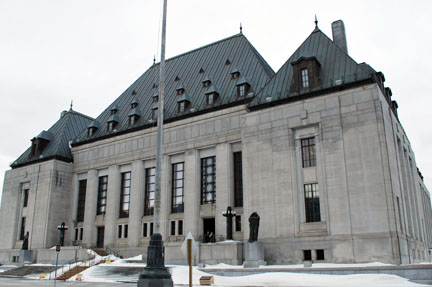OTTAWA — The Supreme Court of Canada overturned a ban on physician-assisted suicide today, unanimously reversing a decision it made in 1993 and putting Canada in the company of a handful of Western countries where the practice will be legal.
 In R. v. Carter, the top court said it would be allowed in the case of consenting adults who are suffering intolerably from a severe and incurable medical condition, though the illness does not have to be terminal. The decision takes effect in 12 months.
In R. v. Carter, the top court said it would be allowed in the case of consenting adults who are suffering intolerably from a severe and incurable medical condition, though the illness does not have to be terminal. The decision takes effect in 12 months.
“We do not agree that the existential formulation of the right to life requires an absolute prohibition on assistance in dying, or that individuals cannot ‘waive’ their right to life,” the court said.
Friday’s decision related to the case of two women with debilitating illnesses who have since died.
The 9-0 judgment, written by “the court,” underlines the unanimity of the decision. It says the current ban infringes on all three of the life, liberty and and security of person provisions in s. 7 of the Charter of Rights and Freedoms.
The SCC considered those rights broadly in agreeing with a B.C. trial judge who said the right to life is not limited to a “right not to die.”
“This would create a duty to live,” rather than a “right to life and would call into question the legality of any consent to the withdrawal or refusal of life-saving or life-sustaining treatment,” said the decision.
Gloria Taylor, an Amyotrophic Lateral Sclerosis patient and activist, who joined the right to die lawsuit in 2011, died of her illness in 2012. ALS is informally called Lou Gehrig’s disease.
The family of a second woman, Kay Carter, who traveled to Switzerland to end her life, were also plaintiffs. Assisted suicide is legal in Switzerland, along with a handful of other European countries and a few U.S. states.
Canada’s Supreme Court last considered assisted suicide in 1993 with the case of Sue Rodriguez, who also suffered from ALS.
“This is one incredible day,” said Grace Pastine, litigation director of B.C. Civil Liberties Association, which initiated the challenge.
“Physician-assisted dying is now recognized for what it is: a medical service that brings an end, for some individuals, to unbearable suffering.”
Parliament can overturn the decision but that is an unlikely outcome.
Since 1993, pressure for assisted suicide has persisted. Last year the Quebec government introduced a bill to legalize it, arguing this was a matter of healthcare under provincial jurisdiction, not a criminal matter in the federal bailiwick.
Religious groups have opposed it as well as organizations representing people with disabilities. They argue that making it easier to end people’s lives is a slippery slope that makes them feel vulnerable.
 In R. v. Carter, the top court said it would be allowed in the case of consenting adults who are suffering intolerably from a severe and incurable medical condition, though the illness does not have to be terminal. The decision takes effect in 12 months.
In R. v. Carter, the top court said it would be allowed in the case of consenting adults who are suffering intolerably from a severe and incurable medical condition, though the illness does not have to be terminal. The decision takes effect in 12 months.“We do not agree that the existential formulation of the right to life requires an absolute prohibition on assistance in dying, or that individuals cannot ‘waive’ their right to life,” the court said.
Friday’s decision related to the case of two women with debilitating illnesses who have since died.
The 9-0 judgment, written by “the court,” underlines the unanimity of the decision. It says the current ban infringes on all three of the life, liberty and and security of person provisions in s. 7 of the Charter of Rights and Freedoms.
The SCC considered those rights broadly in agreeing with a B.C. trial judge who said the right to life is not limited to a “right not to die.”
“This would create a duty to live,” rather than a “right to life and would call into question the legality of any consent to the withdrawal or refusal of life-saving or life-sustaining treatment,” said the decision.
Gloria Taylor, an Amyotrophic Lateral Sclerosis patient and activist, who joined the right to die lawsuit in 2011, died of her illness in 2012. ALS is informally called Lou Gehrig’s disease.
The family of a second woman, Kay Carter, who traveled to Switzerland to end her life, were also plaintiffs. Assisted suicide is legal in Switzerland, along with a handful of other European countries and a few U.S. states.
Canada’s Supreme Court last considered assisted suicide in 1993 with the case of Sue Rodriguez, who also suffered from ALS.
“This is one incredible day,” said Grace Pastine, litigation director of B.C. Civil Liberties Association, which initiated the challenge.
“Physician-assisted dying is now recognized for what it is: a medical service that brings an end, for some individuals, to unbearable suffering.”
Parliament can overturn the decision but that is an unlikely outcome.
Since 1993, pressure for assisted suicide has persisted. Last year the Quebec government introduced a bill to legalize it, arguing this was a matter of healthcare under provincial jurisdiction, not a criminal matter in the federal bailiwick.
Religious groups have opposed it as well as organizations representing people with disabilities. They argue that making it easier to end people’s lives is a slippery slope that makes them feel vulnerable.







